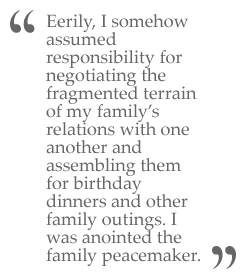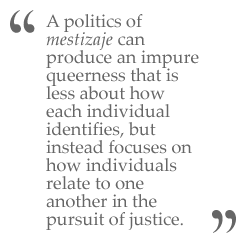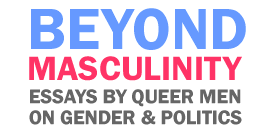Mestiza/o Gender
After
I graduated from college, I moved back home. Well sort
of. Since my parents had divorced in 1999, home had
become an unstable place. This instability only grew, so
that by 2006, when I returned to the cement and asphalt
plains of Los Angeles from the verdant river valleys of
Ohio, my home had ironically shifted from wherever my
mother lived to where my father lived. So it was to my
father’s home that I returned in the summer of 2006. It
was there that the questions about my gender, sexuality
and race that I had been mulling over for years began to
give way to tentative answers.
 Once
at home after half a decade away, I suddenly found
myself caught up in the all-encompassing net that is my
family. Again, I was subject to unreasonable invasions
of privacy, minor outbursts of homophobia, and the
ever-present reminders to fix my bed. I had also lost
the ability to bring over men whenever I wanted. These
changes, however, paled before the greatest change of
all: whereas before I had been the angry black sheep of
the family, I was now the only one everyone spoke to.
Eerily, I somehow assumed responsibility for negotiating
the fragmented terrain of my family’s relations with one
another and assembling them for birthday dinners and
other family outings. I was anointed the family
peacemaker.
Once
at home after half a decade away, I suddenly found
myself caught up in the all-encompassing net that is my
family. Again, I was subject to unreasonable invasions
of privacy, minor outbursts of homophobia, and the
ever-present reminders to fix my bed. I had also lost
the ability to bring over men whenever I wanted. These
changes, however, paled before the greatest change of
all: whereas before I had been the angry black sheep of
the family, I was now the only one everyone spoke to.
Eerily, I somehow assumed responsibility for negotiating
the fragmented terrain of my family’s relations with one
another and assembling them for birthday dinners and
other family outings. I was anointed the family
peacemaker.
The
shift in my position within my family dramatically
crystallized around my younger teenage brother. In his
senior year of high school, my brother was at a
crossroads in his life and preparing for the
life-altering transition to college when I moved back.
Building on years of close friendship, I became my
younger brother’s parent. Emotionally, I supported his
ideas and dreams and made it my priority that he was
listened to and nurtured. I intervened between him and
my father to ensure that my brother received all the
material things he needed. I was and am my brother’s
queer mother.
In
the course of becoming mother-figure to my younger
brother, I saw in myself a concrete example of the other
type of queerness I had been searching for. The queer
gender I occupy in my family now is in many ways a
continuation of the culerito place of my youth,
but with significant changes. My queerness is spoken and
named for what it is. I discuss with my family my
attraction to men and share my critiques of
heterosexuality. While accepting the connectivity
central to Latin American homosexuality, I also value
the balancing individuality I learned as an American
queer. Combined, these two elements of two different
systems of homosexuality have enabled me to construct a
masculinity that is nurturing and supportive.
The
complementary mixture of homosexualities that defines my
present queerness has led me to realize the need to
employ the practice of mestizaje to create new
forms of sexuality. Drawing together the most useful
elements of various global forms of homosexuality so as
to craft personal homosexualities that challenge both
heterosexism and the emergent hegemonic form of gayness
in the United States, is a task to which mestizaje
is uniquely well-suited for.
With
the mestiza/o gender I am creating, my queerness
moves beyond a matter of sexual identity and becomes an
encompassing gender location. I embrace the ambiguous
position of the Latin American puto and realize
that pursuing masculinity is not only futile but it is
harmful both to me and others. The mestiza/o
politics of ambiguity show me that to be a gay man in a
unified and stable sense isn't possible. The acts of
exclusion that are required in creating a stable
identity of gay masculinity, through the mestiza/o
lens, are exposed as immoral and highly suspect. By
buying into the binary gender system, queer men support
the oppression of women, transpeople, and other gender
deviants.
The space that Latin American homosexuals
occupy in the gender system can provide queer men with a
means to construct identities that alter patriarchy and
create coalitions of change with others. The gendered
basis of Latin American homosexuality, however, must be
tempered by the protection of the individual that
American gayness so heavily emphasizes. By ensuring that
individuals are allowed to develop and creatively
construct their own identities, the gendered
articulation of homosexuality in Latin America can
become truly emanicpatory. This mestiza/o
combination is what I seek to create by living it
everyday.
 I
recognize the potential dangers of engaging in the
selective extraction and mixing of elements from diverse
cultures, but I believe that the need for new forms of
homosexualities justifies taking those risks. A politics
of mestizaje can produce an impure queerness that
is less about how each individual identifies, but
instead focuses on how individuals relate to one another
in the pursuit of justice. Claiming common cause with
others, that is building a coalitional community of
change, is an uneven process that must center not on the
identities people wear and own, but instead on the act
of relating. Who we relate to and how we relate to them
is what should define us as queer. Thinking about
queerness as a set of relations moves it from the realm
of individual sexual identity towards a way of being.
This shift sets queerness in the realm of gender, an
all-encompassing script that defines who and what we
are. Mestizaje opens up the category of gender,
which is rightfully seen as a limiting force, into a
means to structure the conflicting mixture of privilege
and oppression that defines many queer men’s
masculinities... (continue reading)
I
recognize the potential dangers of engaging in the
selective extraction and mixing of elements from diverse
cultures, but I believe that the need for new forms of
homosexualities justifies taking those risks. A politics
of mestizaje can produce an impure queerness that
is less about how each individual identifies, but
instead focuses on how individuals relate to one another
in the pursuit of justice. Claiming common cause with
others, that is building a coalitional community of
change, is an uneven process that must center not on the
identities people wear and own, but instead on the act
of relating. Who we relate to and how we relate to them
is what should define us as queer. Thinking about
queerness as a set of relations moves it from the realm
of individual sexual identity towards a way of being.
This shift sets queerness in the realm of gender, an
all-encompassing script that defines who and what we
are. Mestizaje opens up the category of gender,
which is rightfully seen as a limiting force, into a
means to structure the conflicting mixture of privilege
and oppression that defines many queer men’s
masculinities... (continue reading)




5 COMMENTS ON THIS ESSAY:
Great essay!Very proud of you for writing this.
GREAT ESSAY!!! good work.
amazing!
i'm so very proud of you, Daniel.
hello daniel
i was wondering, is there maybe a spanish version of your article?
(i would like a spanish/french friend of mine who's lived in latin america for some years to read your piece, and english is difficult for her)
daniel mang
toulouse/france